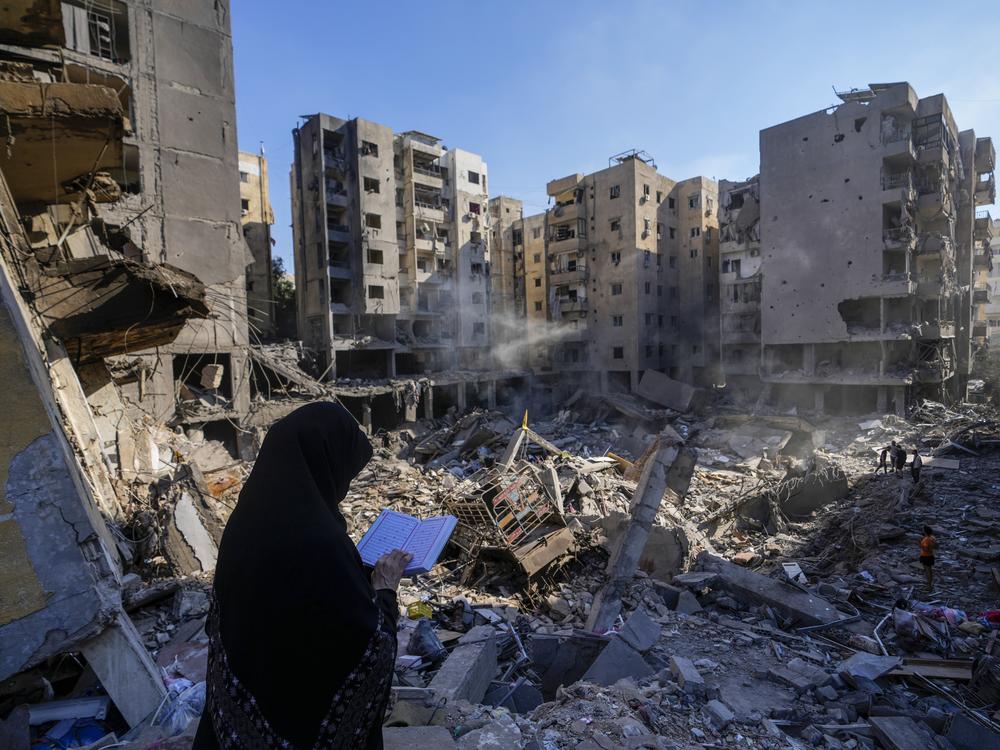Section Branding
Header Content
IDF prepares to invade southern Lebanon as 2 more Hezbollah leaders are presumed dead
Primary Content
Israel’s military says it carried out “dozens” of additional raids on Hezbollah targets early Sunday, as reports circulated that another two senior Hezbollah commanders were assassinated following the assassination of the militant group’s leader Hassan Nasrallah in a southern suburb of Beirut.
In a statement, the IDF said it had eliminated Nabil Kaouk, head of Hezbollah’s preventative security council.
Hezbollah did not comment on Kaouk's whereabouts, but it separately confirmed the death of another senior commander, Ali Karaki.
At least 11 people were killed in the latest strikes, according to Lebanon's National News Agency.
Israeli Prime Minister Benjamin Netanyahu returned to Israel earlier than expected from his trip to the United Nations as Israel was said to be preparing for an invasion into southern Lebanon after reservists were called up to Israel's north.
In a statement on the messaging app Telegram, the Israel Defense Forces (IDF) said its air forces targeted “buildings where weapons and military structures of the organization were stored.”
The IDF says it has attacked hundreds of Hezbollah targets since Saturday, aiming its attacks in Dahieh, a densely populated southern suburb of Beirut and Hezbollah stronghold.
"The IDF continues to attack with force, damage and degrade Hezbollah's military capabilities and infrastructure in Lebanon," the Israeli military said in a post on X.
Israeli strikes left another 33 people dead on Saturday, according to the Lebanese health ministry, and an additional 195 people wounded.
Meanwhile, the IDF also said it had intercepted eight projectiles launched from Lebanon into Israel on Sunday, hitting open areas near Tiberias in Israel's north.
The latest exchanges of fire, combined with Israel's preparations to invade southern Lebanon has mounted fears that the conflict between Israel and Hezbollah was heading toward an all-out war.
Israel's killing of Nasrallah, in particular, represents another dramatic new development for a conflict that has metastasized across the Middle East region since last October.
In a statement on Saturday, Netanyahu stood by the move, calling it necessary to "change the balance of power in the region for years to come.”
“Nasrallah was not a terrorist; he was the terrorist,” Netanyahu said in a statement, warning of challenging days ahead.
World Leaders Continue Calls for Ceasefire
Even as Israeli forces prepared for a response to retaliatory strikes from Hezbollah, Lebanon’s Information Minister said on Sunday that negotiations for a ceasefire with Israel were still “underway” even as cross-border exchanges of fire continued.
The U.S., France, the U.K. and other allies have called for a 21-day ceasefire between Israel and Hezbollah, even as the prospect of any such agreement appears less and less likely.
"It's time for a ceasefire now," President Joe Biden told reporters on Saturday as he left a church in Rehoboth Beach, Delaware.
Asked about Nasrallah’s killing, however, Biden said the longtime Hezbollah leader’s death was “a measure of justice” for victims of his four-decade “reign of terror.”
In a separate statement, Biden noted the operation to take out Nasrallah happened within the wider context of the Oct. 7, 2023 Hamas attacks against Israel.
“Nasrallah, the next day, made the fateful decision to join hands with Hamas and open what he called a ‘northern front’ against Israel,” Biden said in a statement.
On Saturday, the U.K. Foreign Secretary David Lammy reiterated calls for a ceasefire, saying in a post on X that he had spoken with the Lebanese Prime Minister Najib Mikati.
“We agreed on the need for an immediate ceasefire to bring an end to the bloodshed,” Lammy said. “A diplomatic solution is the only way to restore security and stability for the Lebanese and Israeli people.”
Mikati told reporters on Sunday that he “welcomes” a ceasefire, adding that if one were to occur, it would need to apply to both Gaza and Lebanon.

